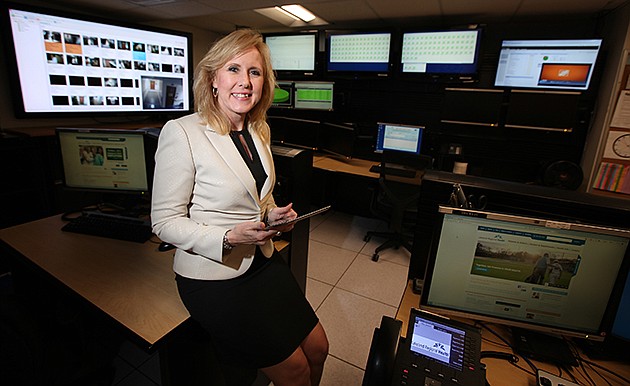There was a time when Polk County IT executive Elizabeth Kerns did everything she could to steer clear of working in a hospital — and not because she's squeamish.
With a degree in chemical engineering, Kerns had worked for GM and for Mobil. She ran information systems and IT for two major law firms. She never considered the medical field. “I avoided health care,” says Kerns, “as did many of my colleagues because health care was always thought to be years behind in technology.”
But with multiple advances in health care technology, particularly mobile health, Kerns, chief information officer at Lakeland Regional Health, now believes she's on the forefront of melding high-tech with function. “I never thought I would stay in health care,” says Kerns, who has been with LRH since 2007. “But not only is the technology moving at light speed, health care captures your heart.”
Proof of Kerns' belief in health care technology comes in some unique industry recognition LRH recently earned: In July, the 849-bed hospital was one of six nationwide to earn a Most Wired Advanced designation. Technology the hospital is recognized for varies from the basics, such as digital health records and an online patient portal, to the more exotic, such as predictive data analytics that aid treatment and diagnoses.
Another innovation at the hospital is Sepsis Crawler. That's an electronic system, created by Kansas City-based Cerner Corp., that goes through LRH's electronic health records to identify patients who may be at risk of developing blood infections. The algorithm for Sepsis Crawler has been in use at LRH for nearly two years, says a hospital spokeswoman.
Most Wired Advanced recognition comes from the American Hospital Association's Health Forum and the College of Healthcare Information Management Executives. The five other Most Wired Advanced hospitals are the University of California San Diego Health System; Baptist Health South Florida in Coral Gables; Crozer-Keystone Health System in Springfield, Pa.; University of Utah Health Care in Salt Lake City; and ThedaCare in Appleton, Wis. More than 300 hospitals, including Tampa General, NCH Healthcare System in Naples and Lee Memorial Health System, made the forum's secondary Most Wired list.
Lakeland Regional officials say the Most Wired Advanced recognition is a boost for the nonprofit, which operates the busiest single-site emergency department in the state and is the fifth-largest hospital in Florida. For one, it's validation for years of expenses in money, time and people. It's also a valuable recruiting tool, both for people in health care IT and anyone in medicine who wants to work in a high-tech environment. That especially includes millennials who seek the latest and greatest work environments.
“Technology is our differentiator,” says Kerns. “But we didn't set out to get Most Wired. We did it because you have to do it to support quality and great patient care.”
Most Wired status is based on a range of metrics, including infrastructure and clinical integration. To earn Most Wired Advanced, according to a statement, a health care system must excel in all the areas.
While proud of the wired achievement, Kerns is already onto what's next. “Our technology standards are so high,” Kerns says, “that the challenge is we have so many ideas and our project list is so long.”
Follow Mark Gordon on Twitter @markigordon






